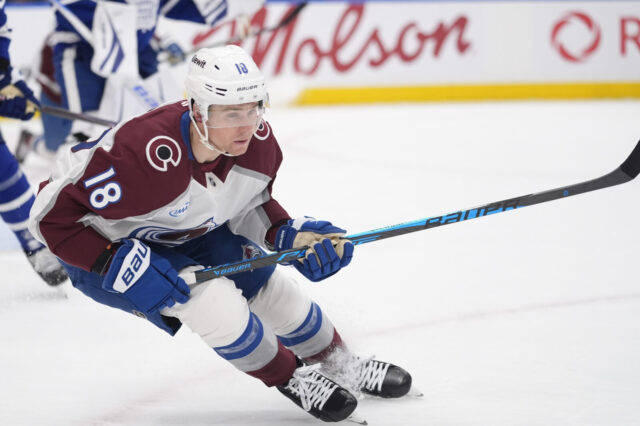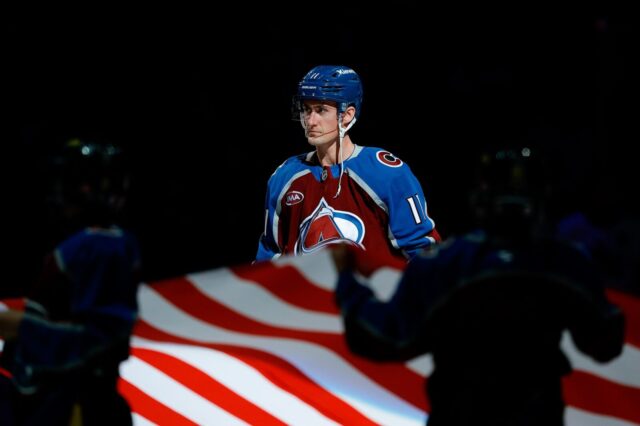My first foray into sport of hockey was a journey with my Pops and his drinking buddies at the request of my mom (much to their chagrined livers), from Greeley down to “Big Mac” as it was called – McNichols Sports Arena.
That night is as clear in my mind as the night I took the car out, went to my first party, got drunk, lost my virginity and got shot at. (I think we have all seen that movie.)
I witnessed one of the grandest spectacles of all time. Called, locally, “Rocky Hockey.” In NHL circles they were known as the castoff Colorado Rockies.
A homeless franchise that hopped the union pacific like a hobo from Kansas City to Denver, they were a team called the Kansas City Scouts who landed here just out of sheer dumb luck. (It was the closet available arena that could support it.) Much like the Kansas City Scouts became the Colorado Rockies, the Quebec Nordiques later became the Colorado Avalanche … but I will get to that later.
As popular as hockey has become here in this region, you couldn’t find a sheet of ice outside of a frozen pond anywhere in Denver back in those days. (Going “get off my lawn guy” here in my Gil Whiteley voice.) “Some of you could use a history lesson when it comes to the Canadian national pastime, which like anything else Canadian lands here anyway.”
I refer to this as the Vaudeville effect: Just another stage for we sports and entertainment types to cherry-pick from, remarketing it and calling it our own. Call it “marketing plagiarism” for you truthers out there. Most of you don’t even know that your favorite actors and comedians are Canadian. I said Canadian not Kardashian. Besides, this is way more important than yellow and brown vertical stripe socks.
This region, not just the city, embraced the team as their own. The Nuggets had seen some relative success but it was futile in nature. The Broncos were, well, the Broncos. (This became an ongoing trend here in the region until 1997 with them.)
National media outlets completely overlooked the significance of the “cowtown” known as Denver, Colorado. Significantly enough, now Denver could boast three of the four major sports. The Montfort cash cow wasn’t a twinkle in Frederico Pena’s eye yet, and this community received no such recognition, and that is a poverty of sports.
Being awed by this frozen showcase for the Front Range to see was a huge draw and the talk of the entire region. I saw grown men carrying beer in plastic milk jugs, families eating sandwiches from home, all as the smell of the ice filled my nostrils.
Beyond the crowded concourses, the commotion of the crowd as it bottle-necked into the arena filled with the stench of something that smelled like a stale beer, trucker B.O., three-year-old nacho cheese, rotting jars of pickled jalapeños, cigarette butts, popcorn, urine and hotdogs.
With vendors hocking the local wares so the owners’ dreams of a cash cow could come to fruition, this was a carnival of spectacle where patrons would show up, drop off their money and leave. When you are seven years old and the safest thing you regularly eat looks like baked turds smeared on a tray, I kindly said, “Cracker Jacks.” Knowing full well I would hear, “Are you sure?” And, “Don’t tell your mother.”
As we were slowly corralled like cattle to our seats; I was soaking in the mob scene. We were late and the game had started, but there were still a good number of fans moving to their seats when they scored. You would have thought that the collection of fans assembled had surely seen their beloved Rockies score before? As the cheers rained down from the rafters, I heard a distant drum a beat I had never heard before – a solemn beat that became louder and louder throughout the arena. It grabbed my eardrums with a pulsating vibration and as we came down the stairs to our seats the crowd stood to its feet and yelled “HEY!” The chant continued and it echoed; it vibrated the concrete steps to a near riot. Pandemonium ensued as a fight broke out with players on the ice yelling, kicking and screaming without helmets – their mullets blowing in the wind as teammates skated to rescue one-another from the melee.
Peering through the crowd like a picket fence as we came to our seats, I looked across the ice through the glass see a gray-haired figure standing behind the bench in a plaid blazer that would make the kilt of William Wallace look like a baby’s blanket.
The jacket belonged to Don Cherry.
He stood behind the Colorado bench like a battlefield general directing his troops. Had our party arrived earlier, we would have been greeted at the entrance with a Cherry Mash candy bar – an unnecessary gate gimmick, but one that worked well, judging by the amount of wrappers on the venue floor.
As the crowd continued to chant “HEY” at the top of their lungs to the beat of Rock and Roll Part II, I knew this was something special.
Later on, Cheecho Resh, Bernie Nichols and Rob Ramage held court on the ice as they saluted Cherry as he came out from behind the bench, under an array of hockey sticks, wearing a cowboy hat and boots. It would have been gold today.
Then, the dark times ensued. The team was sold and the franchise became the New Jersey Devils. Again with a hobos life, and with fitting name, given the east coast bias considered by all things west of the Mississippi. This region became a hockey purgatory once again.
***
In 1994, ice sheets were still as novelty here as malls at Christmas. There were small pockets of hockey. The Colorado Flames came through as well as the Denver Grizzlies. We even had a hero to cheer for in a goalie by the name of Thomas Salo. It wasn’t until the downfall of sports in Quebec that Colorado hockey would once again be put on the map in the Mile High City.
The city of Quebec had just lost the national pastime of Canada. The beloved Nordiques, a team on the rise in the NHL was to be sold and moved to Denver. The team itself was great. It had a good coach in Mark Crawford, an excellent assistant coach in Joel Quenneville, a deep pool of talent with names like Peter Forsberg and Joe Sakic, defenseman like Adam Foote, and a GM who wasn’t scared to pull the trigger on possibly the biggest trade in the history of the NHL, Pierre Lacroix. He had the stones to make a move for possibly the greatest goalie of all time and add him to that bevy of talent the organization already possessed.
Living for a time in Los Angeles, watching the Kings and Wayne Gretzky, I had seen Patrick Roy in his couch cushions grace the ice of The Forum during the Stanley Cup Finals when he was with the Canadiens. This trade pushed the Avalanche over the top. As soon as Lé Magnificencé put on a Colorado sweater, Lords Stanley’s chalice was the only stop for this band of miscreants.
It was my first night back in Colorado after living in California for the previous nine years. I remember the Florida Panthers goalie John Vanbiesbrouck from his time with the Tulsa Oilers after they went bankrupt and the league forced them to play out the remainder of the 1983-84 season in Denver.
It was hot and I wasn’t used to the altitude yet, but I understood the importance of a Stanley Cup Final and the opportunity the Colorado Avalanche had as I sat and watched on that sweltering evening here in Denver.
Adjusting my rabbit ears on the console TV I had given blood for earlier that day by dragging it up three flights of stairs, I thought that maybe for the first time in my life I might get to see the place that I call home bring home not only a championship but the pinnacle of all championships: Lord Stanley’s Cup.
With a slap shot that that sounded more like a strike of Thor’s mighty hammer, Uwe Krupp, a German defenseman that had been injured early in the season, came up with the biggest moment of his life: The slap shot that sent Colorado to the top of the sporting world.
For the very first time all eyes were on Denver, because it held the most important trophy in sports. It was storybook, the team arriving, the trade for Roy, the war with the Red Wings in the previous round that would set the tone for one of the bloodiest and ugliest spectacles in sport possibly ever.
Image Credit: Complex.com



